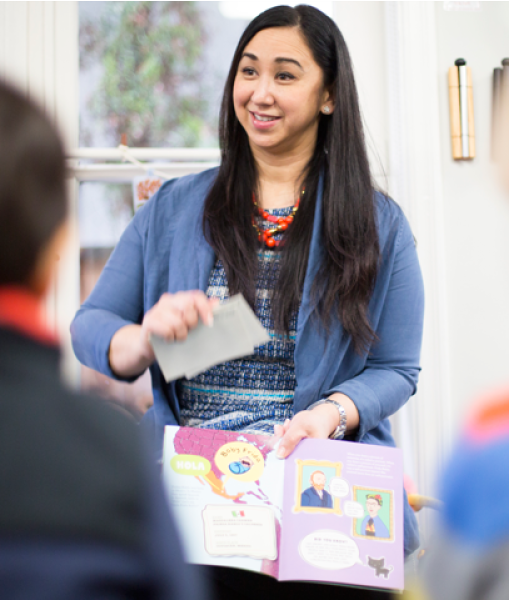MONTESSORI CURRICULUM
The Montessori PhilosophyWMS adheres to the unique educational philosophy set out a century ago by Dr. Maria Montessori. The Montessori philosophy aims to develop the child's innate desire to learn by using a child's natural curiosity and love of knowledge. The child is able to learn and acquire an 'inner discipline' free of the need for external reinforcements.
To educate the whole child Dr. Montessori felt the child must have the freedom to learn at his or her own pace and in an individualized manner. The Montessori teachers (Guide) direct the child’s energies into constructive learning channels, taking into account the differences in learning styles and pace. The environment is specially prepared to encourage directed, independent learning. The teachers guide the activity by providing knowledge in the form of presentations. The child is able to learn and acquire an ‘inner discipline’ free of the need for external reinforcements. This is the core of the Dr. Montessori educational philosophy. |
Areas of Study
Practical LifePractical Life exercises help to instill care for self, for others, and for the environment. Activities include many of the tasks children see as part of the daily routine in their home, such as pouring, buttoning, sorting along with exercises of grace and courtesy. Through these tasks, children develop muscular coordination, enabling movement and the exploration of their surroundings. They learn to work at a task from beginning to end, and to develop their powers of control and concentration.
Within the Elementary program, the Practical Life curriculum expands from the foundation laid in Early Childhood. Practical Life at the Elementary level shifts from a focus on self-care and fine motor skills, to skills that help children connect with their interests in the outside world, organize their time and take part in their community. Lessons that teach responsibility are the focus. Work plans support organization and time management skills are incorporated into the daily routine. Children make independent work choices, prioritize activities and meet deadlines. |
LanguageIn Montessori Casa classrooms, reading is taught with the ‘phonetic’ method - learning the sounds of the letters in preparation for reading and word building. We use the combination of the Itchy's Alphabet phonics lessons and the Montessori language approach. When ready, students participate in a Reading Program and take levelled books home twice every week.
Reading and writing are integral to all subjects in Montessori Elementary, as children express their interests and satisfy their curiosity. Students master conventions with thorough studies of grammar, spelling, and mechanics. They produce final copies with careful penmanship and keyboarding. They read, analyze, think critically, and compare and contrast literature to support personal opinion and perspective. Using these reading and writing skills, they present ideas through formal and informal presentations. |
MathEarly Math activities help young children learn and understand number concepts by manipulating tactile materials. This work gives children a solid understanding of basic mathematical principles, prepares them for later abstract reasoning, and helps to develop problem-solving capabilities.
The ideas of number concepts, place value, numerals, and related quantities are reinforced and expanded upon within the Elementary program. Newfound purposes for familiar math materials provide children with the means to consider number concepts, mathematical operations, and more complex functions, helping to expand advanced mathematical knowledge and understanding. |
Social SciencesOur Social Sciences curriculum explores the areas of science, social studies, geography, art and history. Children are exposed to a rich, stimulating variety of work through hands-on learning. Working with the cultural materials help children become aware that they are part of the greater family of humanity.
In the Elementary classroom, Interdisciplinary and integrated studies of geology, geography, physical and life sciences, anthropology, and history are built around “Great Lessons,” a series of dramatic stories that explore the origins of the universe, our planet, and the continuous development of human advancement. The laws of physics and chemistry reveal the interdependency of all living things. Beginning with a study of civilization, students explore the contributions of history and what it means to be a responsible citizen and to seek ways to make the world a better, more peaceful place. |
SensorialSensorial Materials serve as tools for development. Children build cognitive skills, and learn to order and classify impressions by touching, seeing, smelling, tasting, listening, and exploring the physical properties of their environment.
|
Executive FunctioningDiverse activities improve a child’s executive functions - their ability to plan ahead, complete tasks with multiple steps, remain focused, meet goals and use self-control. As Dr. Adele Diamond states, “To be successful takes creativity, flexibility, self-control and discipline. Central to all those are executive function including mentally playing with ideas, giving a considered rather than an impulsive response, and staying focussed.” The Montessori classroom allows children to use all of their senses to learn, move freely throughout the space and follow their curiosity to learn deeply.
|
An Established Community
With a 37 year history, Westside Montessori School is a well-established school on the west side of Vancouver. Located in a converted house at 4157 Oak Street, the school is separated into two large, open and airy classrooms filled with the highest quality Montessori materials. Our outdoor space boasts of outdoor classroom spaces, a covered play space, two play structures, a children’s garden, area for bikes and scooter play and a large sand-box.
The past 7 years have seen our expansion to our Elementary location at 3396 Cambie Street with one exceptionally large, light-filled, mixed-age classroom, a specialist classroom and an outdoor classroom space. We are currently in the process of further expanding our Elementary location.
Both locations are fully licensed facilities with Vancouver Coastal Health and the BC Ministry of Education. Staff hold their Independent School Teaching Certificates with the Ministry of Education, Early Childhood Educator licences and Montessori Teacher qualifications.
The past 7 years have seen our expansion to our Elementary location at 3396 Cambie Street with one exceptionally large, light-filled, mixed-age classroom, a specialist classroom and an outdoor classroom space. We are currently in the process of further expanding our Elementary location.
Both locations are fully licensed facilities with Vancouver Coastal Health and the BC Ministry of Education. Staff hold their Independent School Teaching Certificates with the Ministry of Education, Early Childhood Educator licences and Montessori Teacher qualifications.
WMS CLASSES |
WMS CASA4157 Oak Street
Vancouver, BC V6H 2N1 |

